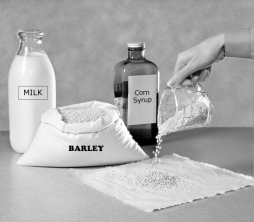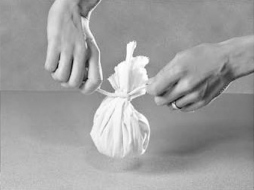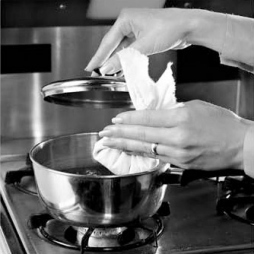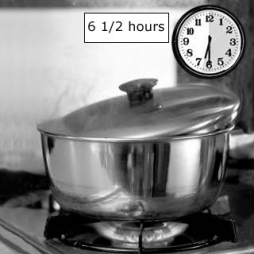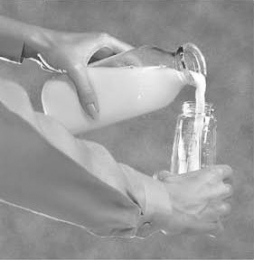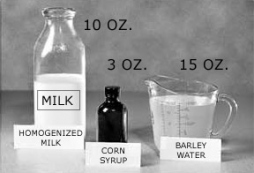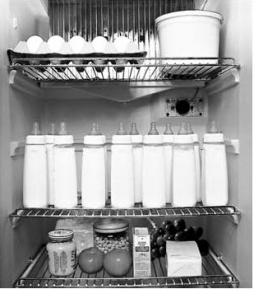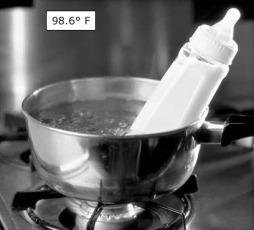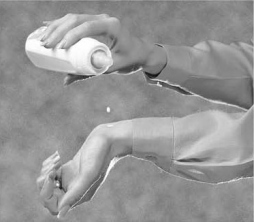An incorrectly fed baby is not only unhappy, he is unhealthy, a matter of concern to any new parent. Proper nourishment is, of course, a necessary ingredient to good health. Based on personal experience, here is something that worked; it is being offered as a helpful tip to parents who seek better ways to raise healthy children.
Some hospitals and
Some prepared food issued at hospitals and by baby doctors has been found to upset a baby. It is a powdered mess one is supposed to dissolve in water and feed to the baby.
If you ever tasted it, you would agree with the baby. It’s terrible.
More than that, it is total
The largest cause of upset in a baby’s early life is just rations. The baby might be fed, yes. But with what? Terrible tasting, high-carbohydrate powdered milk solutions, or skim breast milk from an overworked mother. A ration must contain a heavy percentage of protein. Protein is the building block for nerves and bones. A soldier, wounded, will not heal without heavy protein intake. Ulcers will not get well without a heavy protein diet being given.
To make brain, bone and tissue, the baby must be given protein. And from two days old to at least three years. That makes strong, pretty, alert babies that sleep well and do well.
This problem was first tackled as a personal matter. As a father with a little boy who was not going to live, fast action had to be taken to save him. He had to be (1) gotten out of the hospital and (2) the trouble discovered and (3) remedied. The total time available was less than twenty-four hours. He was dying.
So (1) he was gotten out of the hospital. And (2) it was found he wouldn’t or couldn’t eat. And (3) a formula that provided him the nutrition he needed was developed and given to him.
The formula utilized barley. Roman troops had marched while living on a diet of barley, the cereal with the highest protein content. This formula is the nearest approach to human milk that can be assembled easily. It is an old Roman formula, no less, from around 2,200 years ago.
It’s a bit of trouble, of course. You have to sacrifice a pot or a small kettle to cook the barley in (it really wrecks a pot, so you just have a barley pot and use only it). And you have to cook barley for a long time to get barley water, and you may forget and it burns. But even so, it’s worth it in terms of a calmer house and a healthy baby.
You mix up a full twenty-four-hour batch of this barley recipe every day, bottle it in sterilized bottles and put it where it will remain cold. And you heat a bottle up to 98.6° F or thereabouts (test it by squirting some on the back of the hand to see if it’s too warm or too cool) before you give it to the baby.
And, although you try to keep the baby on a schedule, you are foolish not to feed him or her when the baby is hungry.
A baby, having eaten a full ration, usually sleeps for hours anyway. If they don’t, there is always a reason, such as a pin or a piece of coal in the bed, wet diapers, something. When a baby who shouldn’t be crying, does, hunt until you find out why. Don’t follow the schools of (1) the baby is just willful or (2) it’s a serious illness that requires an immediate operation. Somewhere between we find the real reason.
Barley Formula for Babies
The foremost reason a baby doesn’t do well is poor rations. And to remedy that, here is a formula one can use:
15 ounces of barley water
10 ounces of homogenized milk
3 ounces of corn syrup
The amount of syrup should be varied—depending on the baby—some like it weak—some take it stronger.
This formula can be multiplied by any number according to the number of bottles desired but the ratio remains the same.
To make the barley water, put about half a cup of whole barley in a piece of muslin, tie loosely to allow for expansion. It is slowly boiled in a covered, vented pot not made of aluminum for 6½ hours in about 4 pints of water. (In venting the pot, one allows steam to escape either through a vent built in the lid [if there is one] or by placing the cover slightly askew so there is an opening between the cover and pot.) Barley water will turn very, very pink. This gives about the right consistency of barley water for making the formula as above.
You don’t feed the baby the actual barley, only the water mixed with the milk and corn syrup, in the ratio as given in the formula above. Do not add anything else to this formula, such as vitamins or cream “to make the formula more nutritious.” The formula is as laid out above. Use this formula and have healthier babies!
HOW TO PREPARE THE BARLEY FORMULA | |
Barley Formula Put about half a cup of whole Tie loosely. Boil slowly for 6½ hours in about Mix the formula in a ratio of: 15 ounces of barley water 10 ounces of homogenized milk 3 ounces of corn syrup | |
physicians or surgeons; doctors.
one of several food substances (such as sugar) consisting of oxygen, hydrogen and carbon. Carbohydrates provide the body with heat and energy.
a fundamental component of all living cells that includes many substances that are necessary for the proper functioning of an organism. It is essential in the diet for the growth and repair of tissue.
a simple sugar that occurs naturally in fruit, honey, and in most plant and animal tissues. It is the principal circulating sugar in the blood and the major energy source of the body. Glucose is also produced commercially in the form of a syrup used in making candies.

